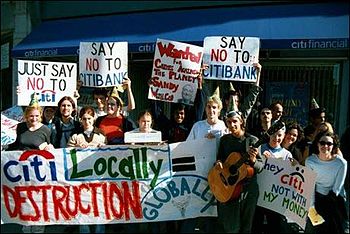| Demonstrators in front of the Delaware, OH office of Citibank at a demonstration against the Citibank's unfair investment policies in poor countries. Taken on November 16, 2001. (Photo credit: Wikipedia) |
When you first heard that the U.S. Supreme Court had cleared the way for sectarian prayer at city council meetings, how did you feel? That's right, I'm asking about how you felt and not what you thought. Based on what I have read online, I think it is a safe bet that many of you felt frustrated, even angry. Me too. I am impatient to see progress, and this decision seemed to be a step backward. Angry is an apt description of how I felt and how I still feel when I think about it.
The day after the Court handed down their decision in Greece v. Galloway, I wrote:
I hope that this decision serves to mobilize secular activists to expand efforts to push for change. National organizations like the Center for Inquiry, Freedom From Religion Foundation, Americans United for Separation of Church and State, and the Secular Coalition for America are speaking out against this ruling, and I hope those of us who value the separation of church and state will join them. If we can channel the frustration we are feeling into activism, some good can come of this.Being an atheist, a skeptic, and/or a secularist in the United States can be a lonely and often frustrating experience. While this is less true today than it was 25 years ago, thanks largely to the Internet, it often seems like we are out of place in a nation gripped by ancient superstition and anti-intellectualism. The fact that a significant portion of our country still opposes evolution by natural selection and believes in angels is astounding. And yet, here we are adrift in a sea of ignorance.
Every atheist I have interacted with over the last 10 years or so has something in common: they know what I mean when I say that it often feels like we are banging our heads against a wall. They can relate to the sense of futility I sometimes experience where it seems like we are investing endless time and energy for little more than slow change. Our task seems truly insurmountable at times. We crave a real breakthrough, and we are frustrated that it hasn't happened yet.
I think we should be frustrated. We should be fed up, even angry. We should be impatient to see the sort of change we want to see (e.g., a substantial decline in religious influence, expanded separation of church and state, increased scientific literacy and acceptance of scientific knowledge, an end to religiously-motivated discrimination). And we should strive to channel all that frustration, anger, and impatience into action. That is, we should use these emotions to fuel activism. We cannot surrender to hopelessness and apathy. Too much is at stake. Now is the time for activism.
At the same time, our frustration, anger, impatience cannot be allowed to get the best of us. We must learn how to use these emotions to accomplish something meaningful rather than being swept away by them. Blindly lashing out at others (e.g., Christians you encounter on Twitter) accomplishes nothing and may even do more harm than good to what we want to accomplish. It makes us look irrational, mean, or out of control. Choose activism instead.
Activism does not have to be polite, nice, or even particularly civil. I'm sure we can all think of admirable examples of in-your-face activism. Not everybody will appreciate it, but I believe it has an important role to play. Still, I think we can agree that even this sort of activism is vastly different from calling some random Christian (or atheist) names on Twitter. That isn't activism.
Use your frustration. Get mad. Be impatient. These feelings are valid and important. They signal that something is seriously wrong here, and it is. We surrounded by people who believe utterly ridiculous things and who are willing to inflict harm on others in the name of these beliefs. The key is to effectively channel these potent feelings into the sort of action that may produce change.
